An Analysis of the Negative Effects of Overprotective Parenting
VerifiedAdded on 2023/06/04
|7
|2611
|190
Essay
AI Summary
This essay, authored by Xue Li, delves into the negative impacts of overprotective parenting on children's development and well-being. The author argues that while parents' intentions are often good, excessive protectiveness can hinder children's independence, social skills, and ability to cope with challenges. The essay explores how overprotective parenting fosters fear, limits exploration, hampers responsibility, and potentially leads to egocentrism and health problems. It examines the concept of "helicopter parenting" and its detrimental effects on children's autonomy and decision-making skills. The essay also highlights the potential for overprotected children to struggle in school, at work, and in forming relationships, ultimately concluding that a balance between guidance and allowing children to experience life's challenges is crucial for healthy development. The essay emphasizes the importance of allowing children to take responsibilities and learn from their own experiences to build resilience and prepare for the future. The essay concludes by emphasizing the importance of finding the right balance between providing support and allowing children to experience the world independently.
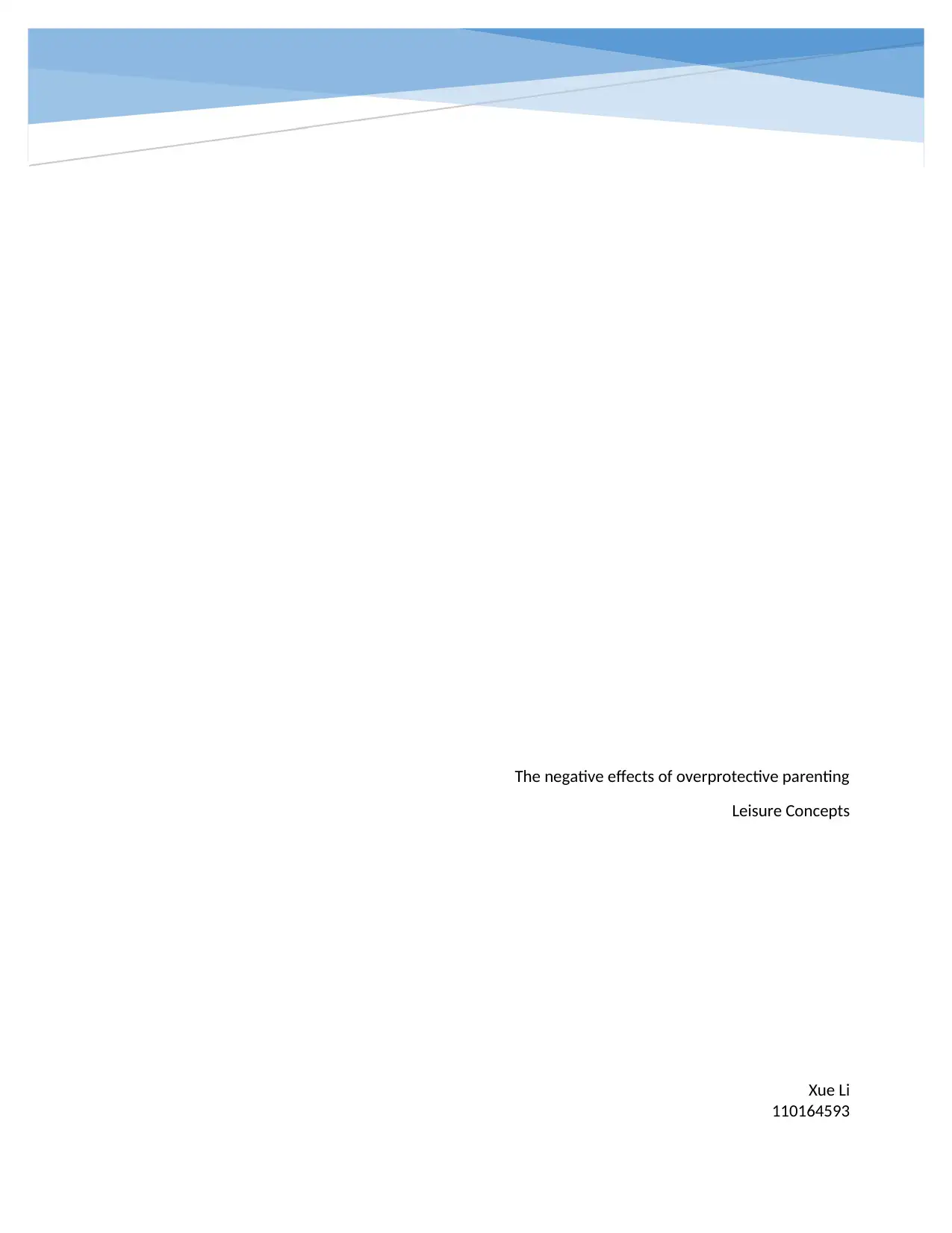
The negative effects of overprotective parenting
Leisure Concepts
Xue Li
110164593
Leisure Concepts
Xue Li
110164593
Paraphrase This Document
Need a fresh take? Get an instant paraphrase of this document with our AI Paraphraser
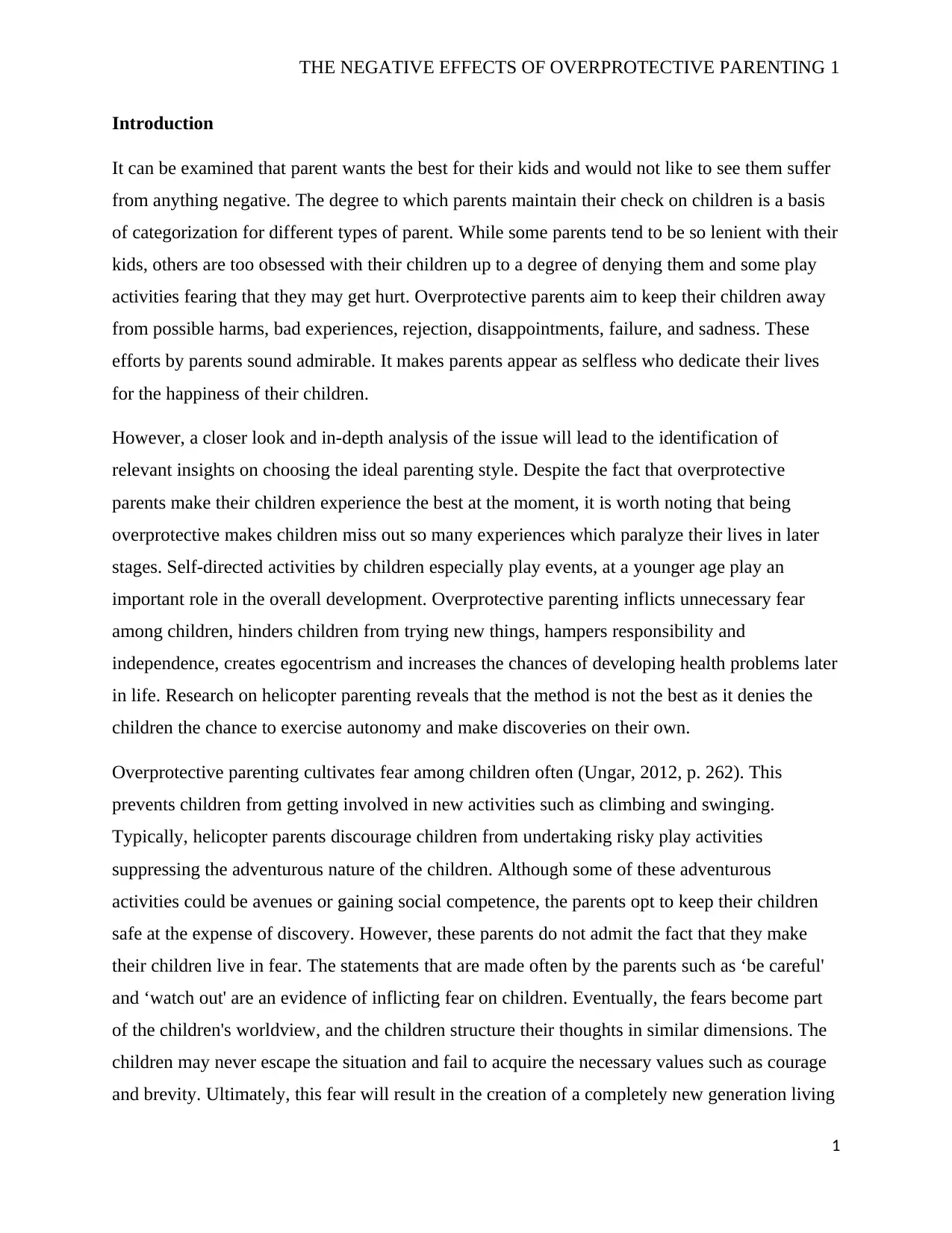
THE NEGATIVE EFFECTS OF OVERPROTECTIVE PARENTING 1
Introduction
It can be examined that parent wants the best for their kids and would not like to see them suffer
from anything negative. The degree to which parents maintain their check on children is a basis
of categorization for different types of parent. While some parents tend to be so lenient with their
kids, others are too obsessed with their children up to a degree of denying them and some play
activities fearing that they may get hurt. Overprotective parents aim to keep their children away
from possible harms, bad experiences, rejection, disappointments, failure, and sadness. These
efforts by parents sound admirable. It makes parents appear as selfless who dedicate their lives
for the happiness of their children.
However, a closer look and in-depth analysis of the issue will lead to the identification of
relevant insights on choosing the ideal parenting style. Despite the fact that overprotective
parents make their children experience the best at the moment, it is worth noting that being
overprotective makes children miss out so many experiences which paralyze their lives in later
stages. Self-directed activities by children especially play events, at a younger age play an
important role in the overall development. Overprotective parenting inflicts unnecessary fear
among children, hinders children from trying new things, hampers responsibility and
independence, creates egocentrism and increases the chances of developing health problems later
in life. Research on helicopter parenting reveals that the method is not the best as it denies the
children the chance to exercise autonomy and make discoveries on their own.
Overprotective parenting cultivates fear among children often (Ungar, 2012, p. 262). This
prevents children from getting involved in new activities such as climbing and swinging.
Typically, helicopter parents discourage children from undertaking risky play activities
suppressing the adventurous nature of the children. Although some of these adventurous
activities could be avenues or gaining social competence, the parents opt to keep their children
safe at the expense of discovery. However, these parents do not admit the fact that they make
their children live in fear. The statements that are made often by the parents such as ‘be careful'
and ‘watch out' are an evidence of inflicting fear on children. Eventually, the fears become part
of the children's worldview, and the children structure their thoughts in similar dimensions. The
children may never escape the situation and fail to acquire the necessary values such as courage
and brevity. Ultimately, this fear will result in the creation of a completely new generation living
1
Introduction
It can be examined that parent wants the best for their kids and would not like to see them suffer
from anything negative. The degree to which parents maintain their check on children is a basis
of categorization for different types of parent. While some parents tend to be so lenient with their
kids, others are too obsessed with their children up to a degree of denying them and some play
activities fearing that they may get hurt. Overprotective parents aim to keep their children away
from possible harms, bad experiences, rejection, disappointments, failure, and sadness. These
efforts by parents sound admirable. It makes parents appear as selfless who dedicate their lives
for the happiness of their children.
However, a closer look and in-depth analysis of the issue will lead to the identification of
relevant insights on choosing the ideal parenting style. Despite the fact that overprotective
parents make their children experience the best at the moment, it is worth noting that being
overprotective makes children miss out so many experiences which paralyze their lives in later
stages. Self-directed activities by children especially play events, at a younger age play an
important role in the overall development. Overprotective parenting inflicts unnecessary fear
among children, hinders children from trying new things, hampers responsibility and
independence, creates egocentrism and increases the chances of developing health problems later
in life. Research on helicopter parenting reveals that the method is not the best as it denies the
children the chance to exercise autonomy and make discoveries on their own.
Overprotective parenting cultivates fear among children often (Ungar, 2012, p. 262). This
prevents children from getting involved in new activities such as climbing and swinging.
Typically, helicopter parents discourage children from undertaking risky play activities
suppressing the adventurous nature of the children. Although some of these adventurous
activities could be avenues or gaining social competence, the parents opt to keep their children
safe at the expense of discovery. However, these parents do not admit the fact that they make
their children live in fear. The statements that are made often by the parents such as ‘be careful'
and ‘watch out' are an evidence of inflicting fear on children. Eventually, the fears become part
of the children's worldview, and the children structure their thoughts in similar dimensions. The
children may never escape the situation and fail to acquire the necessary values such as courage
and brevity. Ultimately, this fear will result in the creation of a completely new generation living
1
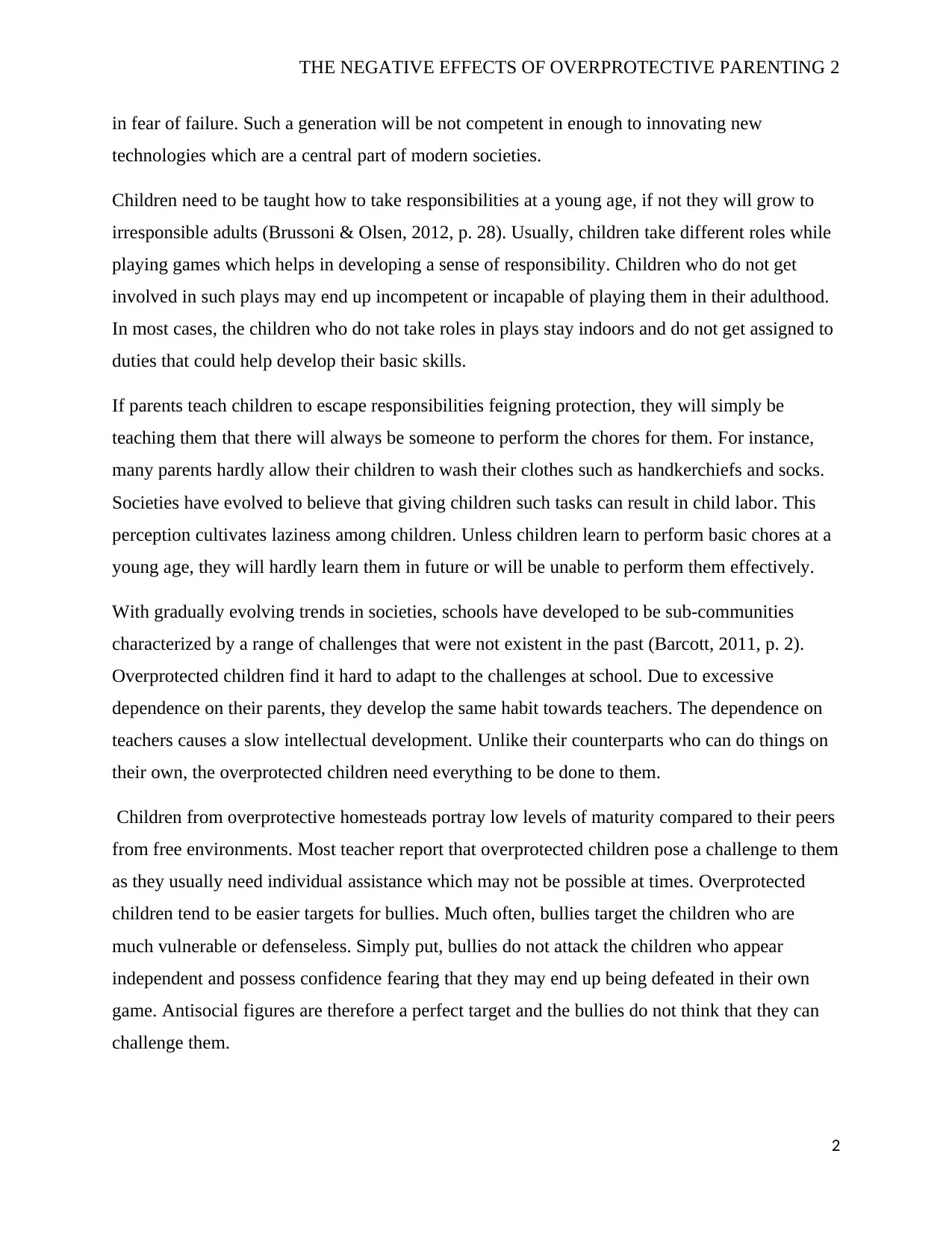
THE NEGATIVE EFFECTS OF OVERPROTECTIVE PARENTING 2
in fear of failure. Such a generation will be not competent in enough to innovating new
technologies which are a central part of modern societies.
Children need to be taught how to take responsibilities at a young age, if not they will grow to
irresponsible adults (Brussoni & Olsen, 2012, p. 28). Usually, children take different roles while
playing games which helps in developing a sense of responsibility. Children who do not get
involved in such plays may end up incompetent or incapable of playing them in their adulthood.
In most cases, the children who do not take roles in plays stay indoors and do not get assigned to
duties that could help develop their basic skills.
If parents teach children to escape responsibilities feigning protection, they will simply be
teaching them that there will always be someone to perform the chores for them. For instance,
many parents hardly allow their children to wash their clothes such as handkerchiefs and socks.
Societies have evolved to believe that giving children such tasks can result in child labor. This
perception cultivates laziness among children. Unless children learn to perform basic chores at a
young age, they will hardly learn them in future or will be unable to perform them effectively.
With gradually evolving trends in societies, schools have developed to be sub-communities
characterized by a range of challenges that were not existent in the past (Barcott, 2011, p. 2).
Overprotected children find it hard to adapt to the challenges at school. Due to excessive
dependence on their parents, they develop the same habit towards teachers. The dependence on
teachers causes a slow intellectual development. Unlike their counterparts who can do things on
their own, the overprotected children need everything to be done to them.
Children from overprotective homesteads portray low levels of maturity compared to their peers
from free environments. Most teacher report that overprotected children pose a challenge to them
as they usually need individual assistance which may not be possible at times. Overprotected
children tend to be easier targets for bullies. Much often, bullies target the children who are
much vulnerable or defenseless. Simply put, bullies do not attack the children who appear
independent and possess confidence fearing that they may end up being defeated in their own
game. Antisocial figures are therefore a perfect target and the bullies do not think that they can
challenge them.
2
in fear of failure. Such a generation will be not competent in enough to innovating new
technologies which are a central part of modern societies.
Children need to be taught how to take responsibilities at a young age, if not they will grow to
irresponsible adults (Brussoni & Olsen, 2012, p. 28). Usually, children take different roles while
playing games which helps in developing a sense of responsibility. Children who do not get
involved in such plays may end up incompetent or incapable of playing them in their adulthood.
In most cases, the children who do not take roles in plays stay indoors and do not get assigned to
duties that could help develop their basic skills.
If parents teach children to escape responsibilities feigning protection, they will simply be
teaching them that there will always be someone to perform the chores for them. For instance,
many parents hardly allow their children to wash their clothes such as handkerchiefs and socks.
Societies have evolved to believe that giving children such tasks can result in child labor. This
perception cultivates laziness among children. Unless children learn to perform basic chores at a
young age, they will hardly learn them in future or will be unable to perform them effectively.
With gradually evolving trends in societies, schools have developed to be sub-communities
characterized by a range of challenges that were not existent in the past (Barcott, 2011, p. 2).
Overprotected children find it hard to adapt to the challenges at school. Due to excessive
dependence on their parents, they develop the same habit towards teachers. The dependence on
teachers causes a slow intellectual development. Unlike their counterparts who can do things on
their own, the overprotected children need everything to be done to them.
Children from overprotective homesteads portray low levels of maturity compared to their peers
from free environments. Most teacher report that overprotected children pose a challenge to them
as they usually need individual assistance which may not be possible at times. Overprotected
children tend to be easier targets for bullies. Much often, bullies target the children who are
much vulnerable or defenseless. Simply put, bullies do not attack the children who appear
independent and possess confidence fearing that they may end up being defeated in their own
game. Antisocial figures are therefore a perfect target and the bullies do not think that they can
challenge them.
2
⊘ This is a preview!⊘
Do you want full access?
Subscribe today to unlock all pages.

Trusted by 1+ million students worldwide
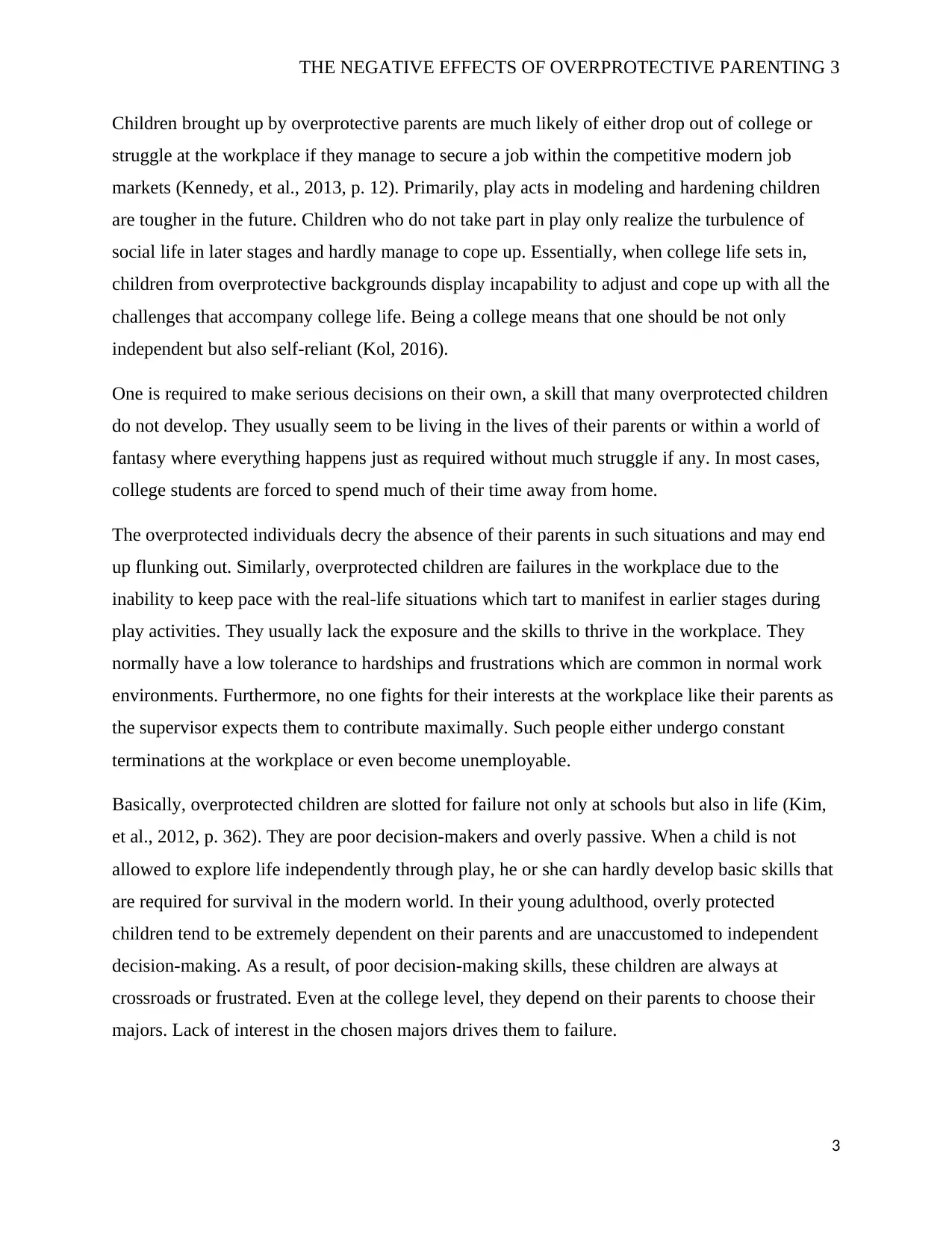
THE NEGATIVE EFFECTS OF OVERPROTECTIVE PARENTING 3
Children brought up by overprotective parents are much likely of either drop out of college or
struggle at the workplace if they manage to secure a job within the competitive modern job
markets (Kennedy, et al., 2013, p. 12). Primarily, play acts in modeling and hardening children
are tougher in the future. Children who do not take part in play only realize the turbulence of
social life in later stages and hardly manage to cope up. Essentially, when college life sets in,
children from overprotective backgrounds display incapability to adjust and cope up with all the
challenges that accompany college life. Being a college means that one should be not only
independent but also self-reliant (Kol, 2016).
One is required to make serious decisions on their own, a skill that many overprotected children
do not develop. They usually seem to be living in the lives of their parents or within a world of
fantasy where everything happens just as required without much struggle if any. In most cases,
college students are forced to spend much of their time away from home.
The overprotected individuals decry the absence of their parents in such situations and may end
up flunking out. Similarly, overprotected children are failures in the workplace due to the
inability to keep pace with the real-life situations which tart to manifest in earlier stages during
play activities. They usually lack the exposure and the skills to thrive in the workplace. They
normally have a low tolerance to hardships and frustrations which are common in normal work
environments. Furthermore, no one fights for their interests at the workplace like their parents as
the supervisor expects them to contribute maximally. Such people either undergo constant
terminations at the workplace or even become unemployable.
Basically, overprotected children are slotted for failure not only at schools but also in life (Kim,
et al., 2012, p. 362). They are poor decision-makers and overly passive. When a child is not
allowed to explore life independently through play, he or she can hardly develop basic skills that
are required for survival in the modern world. In their young adulthood, overly protected
children tend to be extremely dependent on their parents and are unaccustomed to independent
decision-making. As a result, of poor decision-making skills, these children are always at
crossroads or frustrated. Even at the college level, they depend on their parents to choose their
majors. Lack of interest in the chosen majors drives them to failure.
3
Children brought up by overprotective parents are much likely of either drop out of college or
struggle at the workplace if they manage to secure a job within the competitive modern job
markets (Kennedy, et al., 2013, p. 12). Primarily, play acts in modeling and hardening children
are tougher in the future. Children who do not take part in play only realize the turbulence of
social life in later stages and hardly manage to cope up. Essentially, when college life sets in,
children from overprotective backgrounds display incapability to adjust and cope up with all the
challenges that accompany college life. Being a college means that one should be not only
independent but also self-reliant (Kol, 2016).
One is required to make serious decisions on their own, a skill that many overprotected children
do not develop. They usually seem to be living in the lives of their parents or within a world of
fantasy where everything happens just as required without much struggle if any. In most cases,
college students are forced to spend much of their time away from home.
The overprotected individuals decry the absence of their parents in such situations and may end
up flunking out. Similarly, overprotected children are failures in the workplace due to the
inability to keep pace with the real-life situations which tart to manifest in earlier stages during
play activities. They usually lack the exposure and the skills to thrive in the workplace. They
normally have a low tolerance to hardships and frustrations which are common in normal work
environments. Furthermore, no one fights for their interests at the workplace like their parents as
the supervisor expects them to contribute maximally. Such people either undergo constant
terminations at the workplace or even become unemployable.
Basically, overprotected children are slotted for failure not only at schools but also in life (Kim,
et al., 2012, p. 362). They are poor decision-makers and overly passive. When a child is not
allowed to explore life independently through play, he or she can hardly develop basic skills that
are required for survival in the modern world. In their young adulthood, overly protected
children tend to be extremely dependent on their parents and are unaccustomed to independent
decision-making. As a result, of poor decision-making skills, these children are always at
crossroads or frustrated. Even at the college level, they depend on their parents to choose their
majors. Lack of interest in the chosen majors drives them to failure.
3
Paraphrase This Document
Need a fresh take? Get an instant paraphrase of this document with our AI Paraphraser
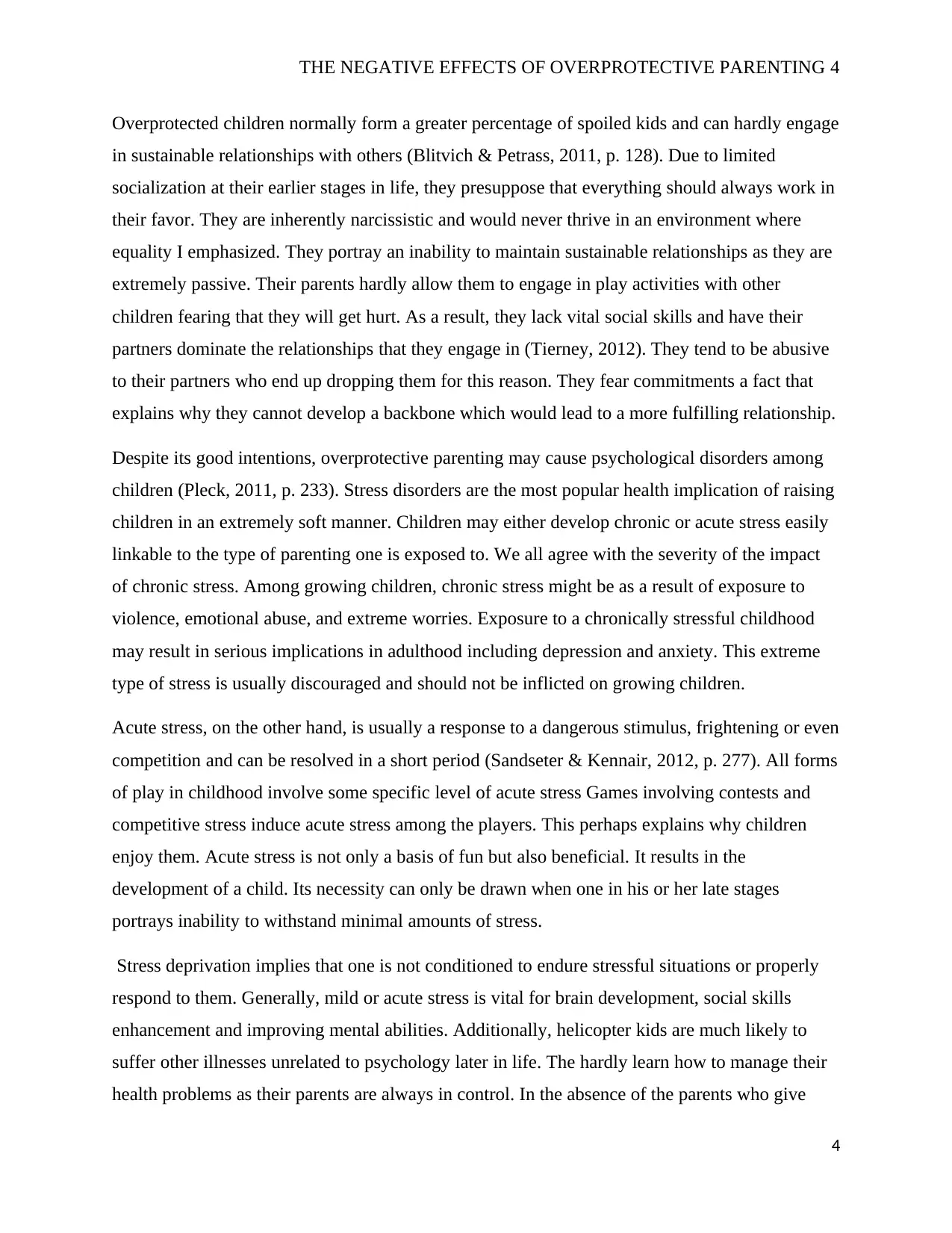
THE NEGATIVE EFFECTS OF OVERPROTECTIVE PARENTING 4
Overprotected children normally form a greater percentage of spoiled kids and can hardly engage
in sustainable relationships with others (Blitvich & Petrass, 2011, p. 128). Due to limited
socialization at their earlier stages in life, they presuppose that everything should always work in
their favor. They are inherently narcissistic and would never thrive in an environment where
equality I emphasized. They portray an inability to maintain sustainable relationships as they are
extremely passive. Their parents hardly allow them to engage in play activities with other
children fearing that they will get hurt. As a result, they lack vital social skills and have their
partners dominate the relationships that they engage in (Tierney, 2012). They tend to be abusive
to their partners who end up dropping them for this reason. They fear commitments a fact that
explains why they cannot develop a backbone which would lead to a more fulfilling relationship.
Despite its good intentions, overprotective parenting may cause psychological disorders among
children (Pleck, 2011, p. 233). Stress disorders are the most popular health implication of raising
children in an extremely soft manner. Children may either develop chronic or acute stress easily
linkable to the type of parenting one is exposed to. We all agree with the severity of the impact
of chronic stress. Among growing children, chronic stress might be as a result of exposure to
violence, emotional abuse, and extreme worries. Exposure to a chronically stressful childhood
may result in serious implications in adulthood including depression and anxiety. This extreme
type of stress is usually discouraged and should not be inflicted on growing children.
Acute stress, on the other hand, is usually a response to a dangerous stimulus, frightening or even
competition and can be resolved in a short period (Sandseter & Kennair, 2012, p. 277). All forms
of play in childhood involve some specific level of acute stress Games involving contests and
competitive stress induce acute stress among the players. This perhaps explains why children
enjoy them. Acute stress is not only a basis of fun but also beneficial. It results in the
development of a child. Its necessity can only be drawn when one in his or her late stages
portrays inability to withstand minimal amounts of stress.
Stress deprivation implies that one is not conditioned to endure stressful situations or properly
respond to them. Generally, mild or acute stress is vital for brain development, social skills
enhancement and improving mental abilities. Additionally, helicopter kids are much likely to
suffer other illnesses unrelated to psychology later in life. The hardly learn how to manage their
health problems as their parents are always in control. In the absence of the parents who give
4
Overprotected children normally form a greater percentage of spoiled kids and can hardly engage
in sustainable relationships with others (Blitvich & Petrass, 2011, p. 128). Due to limited
socialization at their earlier stages in life, they presuppose that everything should always work in
their favor. They are inherently narcissistic and would never thrive in an environment where
equality I emphasized. They portray an inability to maintain sustainable relationships as they are
extremely passive. Their parents hardly allow them to engage in play activities with other
children fearing that they will get hurt. As a result, they lack vital social skills and have their
partners dominate the relationships that they engage in (Tierney, 2012). They tend to be abusive
to their partners who end up dropping them for this reason. They fear commitments a fact that
explains why they cannot develop a backbone which would lead to a more fulfilling relationship.
Despite its good intentions, overprotective parenting may cause psychological disorders among
children (Pleck, 2011, p. 233). Stress disorders are the most popular health implication of raising
children in an extremely soft manner. Children may either develop chronic or acute stress easily
linkable to the type of parenting one is exposed to. We all agree with the severity of the impact
of chronic stress. Among growing children, chronic stress might be as a result of exposure to
violence, emotional abuse, and extreme worries. Exposure to a chronically stressful childhood
may result in serious implications in adulthood including depression and anxiety. This extreme
type of stress is usually discouraged and should not be inflicted on growing children.
Acute stress, on the other hand, is usually a response to a dangerous stimulus, frightening or even
competition and can be resolved in a short period (Sandseter & Kennair, 2012, p. 277). All forms
of play in childhood involve some specific level of acute stress Games involving contests and
competitive stress induce acute stress among the players. This perhaps explains why children
enjoy them. Acute stress is not only a basis of fun but also beneficial. It results in the
development of a child. Its necessity can only be drawn when one in his or her late stages
portrays inability to withstand minimal amounts of stress.
Stress deprivation implies that one is not conditioned to endure stressful situations or properly
respond to them. Generally, mild or acute stress is vital for brain development, social skills
enhancement and improving mental abilities. Additionally, helicopter kids are much likely to
suffer other illnesses unrelated to psychology later in life. The hardly learn how to manage their
health problems as their parents are always in control. In the absence of the parents who give
4
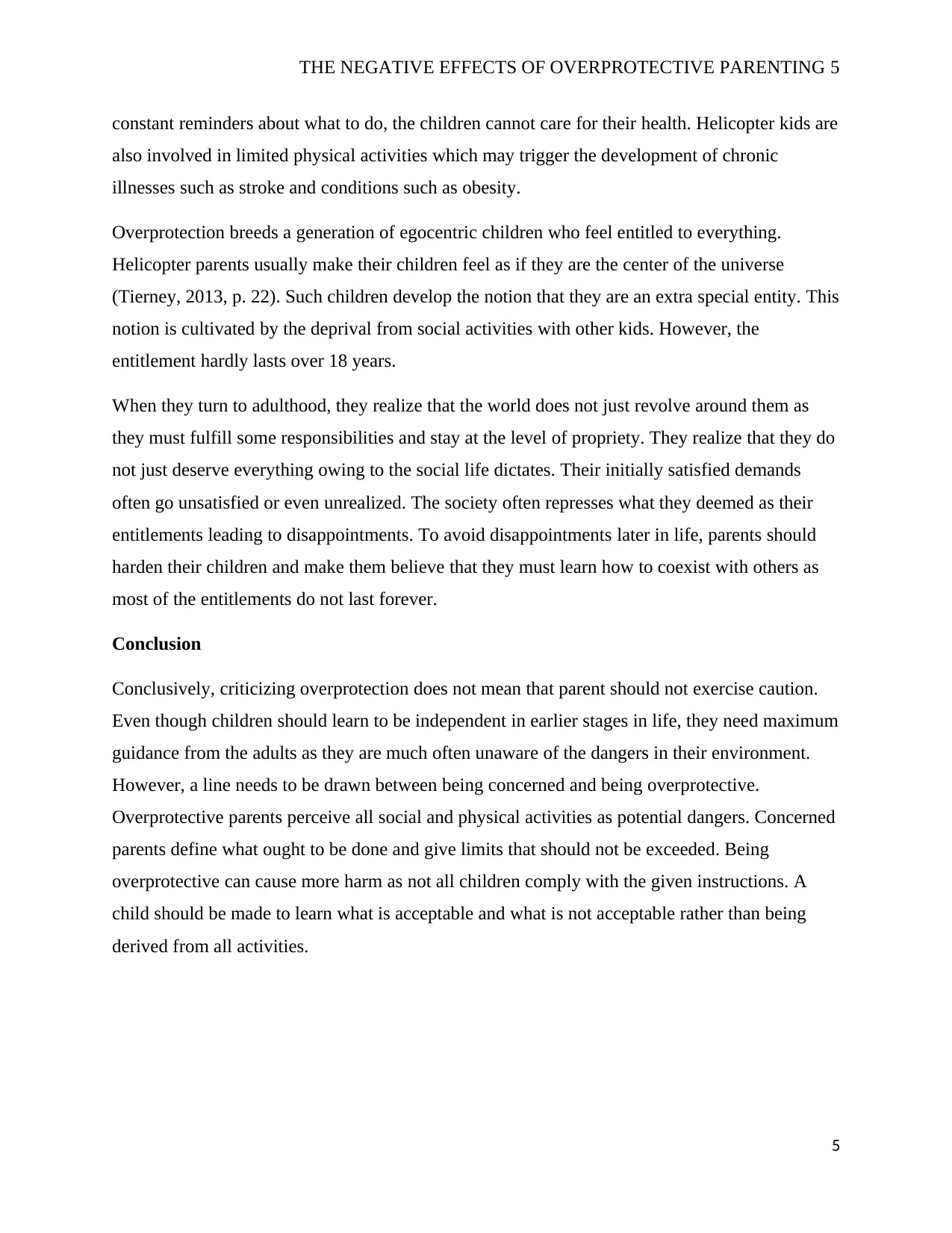
THE NEGATIVE EFFECTS OF OVERPROTECTIVE PARENTING 5
constant reminders about what to do, the children cannot care for their health. Helicopter kids are
also involved in limited physical activities which may trigger the development of chronic
illnesses such as stroke and conditions such as obesity.
Overprotection breeds a generation of egocentric children who feel entitled to everything.
Helicopter parents usually make their children feel as if they are the center of the universe
(Tierney, 2013, p. 22). Such children develop the notion that they are an extra special entity. This
notion is cultivated by the deprival from social activities with other kids. However, the
entitlement hardly lasts over 18 years.
When they turn to adulthood, they realize that the world does not just revolve around them as
they must fulfill some responsibilities and stay at the level of propriety. They realize that they do
not just deserve everything owing to the social life dictates. Their initially satisfied demands
often go unsatisfied or even unrealized. The society often represses what they deemed as their
entitlements leading to disappointments. To avoid disappointments later in life, parents should
harden their children and make them believe that they must learn how to coexist with others as
most of the entitlements do not last forever.
Conclusion
Conclusively, criticizing overprotection does not mean that parent should not exercise caution.
Even though children should learn to be independent in earlier stages in life, they need maximum
guidance from the adults as they are much often unaware of the dangers in their environment.
However, a line needs to be drawn between being concerned and being overprotective.
Overprotective parents perceive all social and physical activities as potential dangers. Concerned
parents define what ought to be done and give limits that should not be exceeded. Being
overprotective can cause more harm as not all children comply with the given instructions. A
child should be made to learn what is acceptable and what is not acceptable rather than being
derived from all activities.
5
constant reminders about what to do, the children cannot care for their health. Helicopter kids are
also involved in limited physical activities which may trigger the development of chronic
illnesses such as stroke and conditions such as obesity.
Overprotection breeds a generation of egocentric children who feel entitled to everything.
Helicopter parents usually make their children feel as if they are the center of the universe
(Tierney, 2013, p. 22). Such children develop the notion that they are an extra special entity. This
notion is cultivated by the deprival from social activities with other kids. However, the
entitlement hardly lasts over 18 years.
When they turn to adulthood, they realize that the world does not just revolve around them as
they must fulfill some responsibilities and stay at the level of propriety. They realize that they do
not just deserve everything owing to the social life dictates. Their initially satisfied demands
often go unsatisfied or even unrealized. The society often represses what they deemed as their
entitlements leading to disappointments. To avoid disappointments later in life, parents should
harden their children and make them believe that they must learn how to coexist with others as
most of the entitlements do not last forever.
Conclusion
Conclusively, criticizing overprotection does not mean that parent should not exercise caution.
Even though children should learn to be independent in earlier stages in life, they need maximum
guidance from the adults as they are much often unaware of the dangers in their environment.
However, a line needs to be drawn between being concerned and being overprotective.
Overprotective parents perceive all social and physical activities as potential dangers. Concerned
parents define what ought to be done and give limits that should not be exceeded. Being
overprotective can cause more harm as not all children comply with the given instructions. A
child should be made to learn what is acceptable and what is not acceptable rather than being
derived from all activities.
5
⊘ This is a preview!⊘
Do you want full access?
Subscribe today to unlock all pages.

Trusted by 1+ million students worldwide
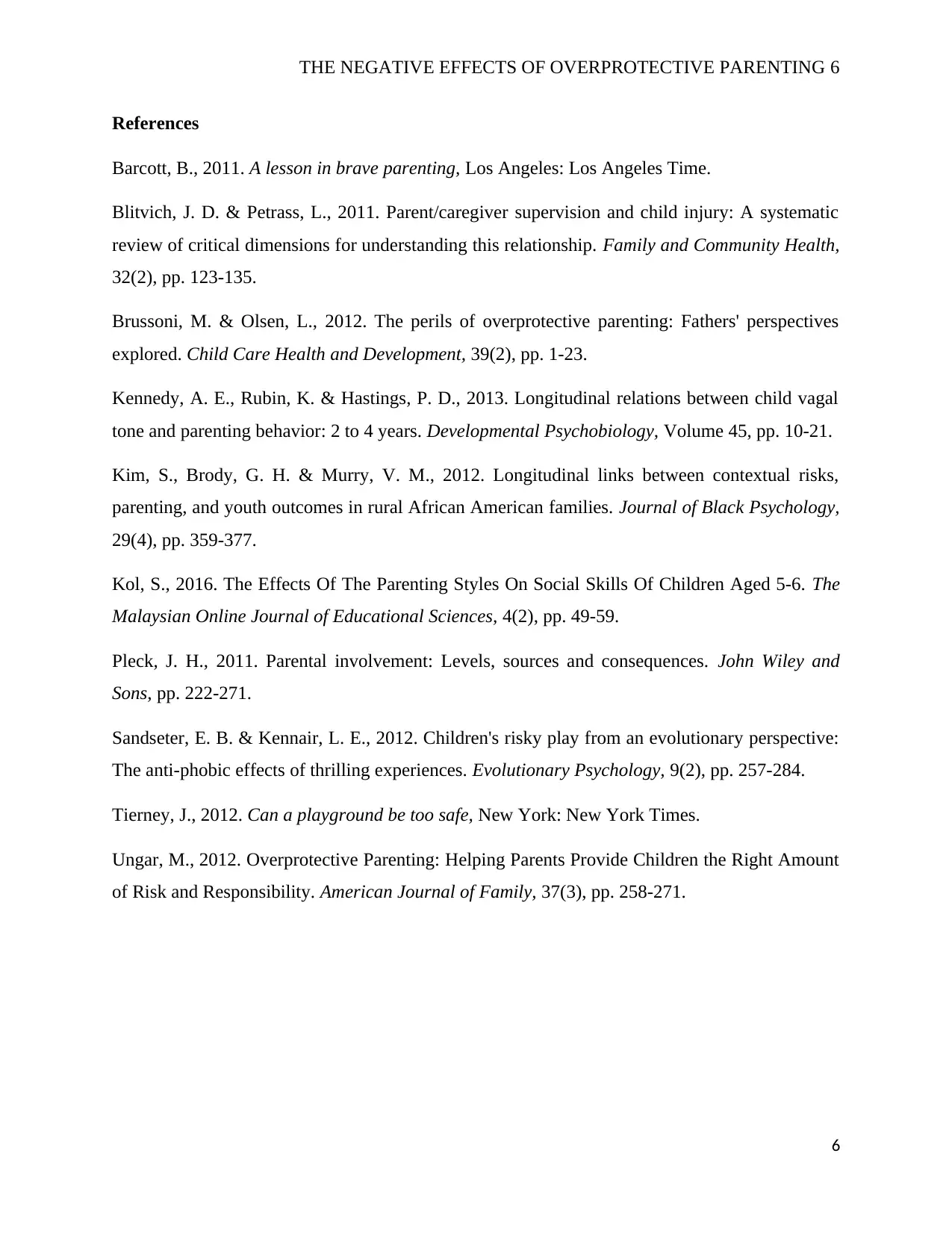
THE NEGATIVE EFFECTS OF OVERPROTECTIVE PARENTING 6
References
Barcott, B., 2011. A lesson in brave parenting, Los Angeles: Los Angeles Time.
Blitvich, J. D. & Petrass, L., 2011. Parent/caregiver supervision and child injury: A systematic
review of critical dimensions for understanding this relationship. Family and Community Health,
32(2), pp. 123-135.
Brussoni, M. & Olsen, L., 2012. The perils of overprotective parenting: Fathers' perspectives
explored. Child Care Health and Development, 39(2), pp. 1-23.
Kennedy, A. E., Rubin, K. & Hastings, P. D., 2013. Longitudinal relations between child vagal
tone and parenting behavior: 2 to 4 years. Developmental Psychobiology, Volume 45, pp. 10-21.
Kim, S., Brody, G. H. & Murry, V. M., 2012. Longitudinal links between contextual risks,
parenting, and youth outcomes in rural African American families. Journal of Black Psychology,
29(4), pp. 359-377.
Kol, S., 2016. The Effects Of The Parenting Styles On Social Skills Of Children Aged 5-6. The
Malaysian Online Journal of Educational Sciences, 4(2), pp. 49-59.
Pleck, J. H., 2011. Parental involvement: Levels, sources and consequences. John Wiley and
Sons, pp. 222-271.
Sandseter, E. B. & Kennair, L. E., 2012. Children's risky play from an evolutionary perspective:
The anti-phobic effects of thrilling experiences. Evolutionary Psychology, 9(2), pp. 257-284.
Tierney, J., 2012. Can a playground be too safe, New York: New York Times.
Ungar, M., 2012. Overprotective Parenting: Helping Parents Provide Children the Right Amount
of Risk and Responsibility. American Journal of Family, 37(3), pp. 258-271.
6
References
Barcott, B., 2011. A lesson in brave parenting, Los Angeles: Los Angeles Time.
Blitvich, J. D. & Petrass, L., 2011. Parent/caregiver supervision and child injury: A systematic
review of critical dimensions for understanding this relationship. Family and Community Health,
32(2), pp. 123-135.
Brussoni, M. & Olsen, L., 2012. The perils of overprotective parenting: Fathers' perspectives
explored. Child Care Health and Development, 39(2), pp. 1-23.
Kennedy, A. E., Rubin, K. & Hastings, P. D., 2013. Longitudinal relations between child vagal
tone and parenting behavior: 2 to 4 years. Developmental Psychobiology, Volume 45, pp. 10-21.
Kim, S., Brody, G. H. & Murry, V. M., 2012. Longitudinal links between contextual risks,
parenting, and youth outcomes in rural African American families. Journal of Black Psychology,
29(4), pp. 359-377.
Kol, S., 2016. The Effects Of The Parenting Styles On Social Skills Of Children Aged 5-6. The
Malaysian Online Journal of Educational Sciences, 4(2), pp. 49-59.
Pleck, J. H., 2011. Parental involvement: Levels, sources and consequences. John Wiley and
Sons, pp. 222-271.
Sandseter, E. B. & Kennair, L. E., 2012. Children's risky play from an evolutionary perspective:
The anti-phobic effects of thrilling experiences. Evolutionary Psychology, 9(2), pp. 257-284.
Tierney, J., 2012. Can a playground be too safe, New York: New York Times.
Ungar, M., 2012. Overprotective Parenting: Helping Parents Provide Children the Right Amount
of Risk and Responsibility. American Journal of Family, 37(3), pp. 258-271.
6
1 out of 7
Related Documents
Your All-in-One AI-Powered Toolkit for Academic Success.
+13062052269
info@desklib.com
Available 24*7 on WhatsApp / Email
![[object Object]](/_next/static/media/star-bottom.7253800d.svg)
Unlock your academic potential
Copyright © 2020–2026 A2Z Services. All Rights Reserved. Developed and managed by ZUCOL.




